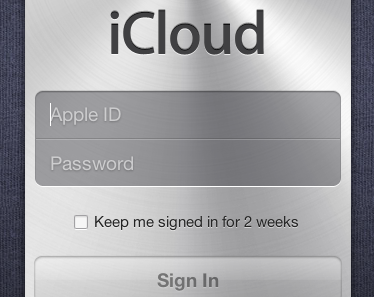The home button on the iPhone 4 stopped working properly for both Jason and I recently. Requiring hard presses or multiple tries to work. It appears that lots of people have this problem. Has it happened to you yet? Let’s track this.

About David
Creator of Ruby on Rails, partner at 37signals, best-selling author, public speaker, race-car driver, hobbyist photographer, and family man.
TechCrunch's mascara tears
Nobody has covered the beauty pageant of startup contestants and venture judges better than TechCrunch. They not only cheered on a generation of Silicon Valley dolls to dress their finest for the pump’n’dump cycle, they fucking owned the barn where the show was held.
So it’s hard to summon a pittance of pity for the mascara tears they’re now sporting. They knew this day was coming. When sugar daddy AOL, father of the Master Plan, pulled out the big checkbook to buy the prettiest doll of tech rags, did they really think it was true love?
Sure, they were all excited at the trophy wedding. TechCrunch was “delighted about becoming part of the AOL family,” and AOL’s PR department was thrilled that “[TechCrunch’s] reputation for top-class journalism precisely matches AOL’s commitment to delivering the expert content critical to this audience”.
But now it’s been 11 months since the check cleared, AOL daddy is all out of sugar, and the TechCrunch trophy is full of dust. Cue a drama worthy of the Bachelorette.
Setting up a new machine for Ruby development
It used to be a jarring experience to setup a new machine for development, but progress has paved the dirt road into a silky smooth autobahn. These are the tools we use today:
- Homebrew: Remember how painful it used to be to get imagemagick installed? Now it takes about a minute. “brew install imagemagick”. Same story for git and other Linux dependencies.
- rbenv/ruby-build: We have some apps running on Ruby 1.8.7, some on 1.9.2, and some on 1.9.3. ruby-build makes it easy to compile all three, rbenv makes it easy to switch between them on a per-project basis. We run rbenv in production as well, so all you need to do to change the Ruby version there is alter .rbenv-version—development and production is always on the same page.
- Bundler: Not everyone at 37signals loved Bundler at first, but now that it’s stable, they’ve been won over. I now curse whenever I have to use an old application that hasn’t been setup with Bundler. Manually tracing down dependencies?! How prehistoric!
rake setup: All our apps has a rake setup task that’ll run bundler, create the databases, import seeds, and install any auxiliary software (little these days) or do any other setup. So when you git clone a new app, you know that “rake setup” will take care of you.- Pow: No more messing with Apache or nginx for local development. All it takes for Pow to add another app is a symlink. All the apps are always configured and available at basecamp.dev, highrise.dev, etc without messing with the hosts file either.
Thanks to Max Howell for Homebrew, Sam Stephenson for rbenv/ruby-build and Pow, and Carl Lerche/Yehuda Katz for Bundler. Thanks to them, starting from scratch has never been easier.

Hey, Yahoo Finance, running junk ads like this doesn’t exactly inspire confidence in your credibility. Ugh.
The best money during the nascent years of a business is patient for growth but impatient for profit.

I wonder if anyone knows the origin of the dreaded “2-weeks only” pattern for login cookies? We used to do that until we realized that we were cargo culting and that we couldn’t come up with a single solid reason for the time restriction (but plenty of reasons why not!).
REWORK sales: Paper ain't dead yet
If you had asked me to guess, I would have said that 60-70% of REWORK sales came from ebooks. It’s a book targeted towards starters, people eager to jump on new trends and technologies, and our natural sphere of influence is with web people. Surely most would be springing for the Kindle or iBookstore versions, right? Wrong.
 We’ve sold about 170,000 copies of REWORK across all media. Only 16% of those sales came ebooks. That’s only slightly higher than the 11% of buyers who went for the audio book. In other words, about three quarters of sales came from good ol’ hardcover books.
We’ve sold about 170,000 copies of REWORK across all media. Only 16% of those sales came ebooks. That’s only slightly higher than the 11% of buyers who went for the audio book. In other words, about three quarters of sales came from good ol’ hardcover books.
Lately, things have been improving somewhat for the ebooks. Our most recent statement shows that 19% of new sales came from ebooks. So things are changing, but not nearly as fast as I would have guessed.
Perhaps a lot of people are gifting REWORK to others (I’ve heard from many employees handing it to their boss!) and it’s easier to give a physical book than an electronic one. Perhaps people are smitten with the beautiful drawings of Mike Rohde and want them in the beautiful print. Perhaps physical books are just still a great way to read.
There’s nothing like watching vintage sitcoms about youngsters getting into amusing stories. [From Iberia’s inflight entertainment descriptions]
Wizards of bullshit: How Forbes turned $6.5 million into $20 billion
Forbes is reporting that Facebook’s Zuckerberg is now richer than the Google’s Sergey and Larry. How did that happen? By using the most naive form of financial extrapolation and calling it fact.
Here’s how the financial alchemy works: GSV Capital spent $6.5 million to buy 225,000 shares at ~$30/share. That amounts to buying about 0.01% of Facebook. They purchased these shares at a 40% premium over the last big valuation that put Facebook to be worth $50 billion.
So if you extrapolate that the premium paid for 0.01% of the company is the same premium someone else would pay for 100% of the company, you get that Facebook is now worth $70 billion. So the relatively modest investment of $6.5M snowballs into a $20 billion creation of “wealth”. That’s a 3076 wealth leverage! Put one dollar in, get $3,076 out.
Now anyone with an iota of critical thinking would perhaps question whether a stock purchase of 0.01% is representative for the worth of the company at large, but not Forbes. They simply accept this fantasy 1:3000 transformation as fact and serves it up as the foundation of an article that then goes on to place Zuckerberg as the 3rd riches techie in the world.
That is grossly irresponsible financial reporting. But hey, Forbes is on a roll these days.
Unfortunately, it’s not exactly an isolated case either. Remember the cover of BusinessWeek from 2006? It had a happy Kevin Rose on the cover with the headline: “How This Kid Made $60 Million In 18 Months”. Anyone wants to ask Kevin how much of that paper money he got to keep as Digg tanked? I’ll bet you a buck that it wasn’t $60 million — or anything close to that.
We used the same math to value 37signals at $100 billion in 2009. It was meant as a joke, but I guess Forbes thought of it as a blueprint.
Tech journalists who make no sense
I’m sure all fields have terrible reporting, but the shit that’s coming out of the tech world must be eligible for some sort of cake. Taste this slice of delicious nonsense that made the Forbes site today in Salesforce CEO Marc Benioff: We’ve Moved Past The Cloud:
Salesforce.com remains a stock with much upside, according to analysts at RBC Capital Markets, as the company continues to control larger quantities of customer data and leads the way to a post cloud world.
WTF does that mean?! So $CRM, which is trading at 416 P/E, is apparently heading to greater heights because it’ll control more data tomorrow? Control it how? What do you mean control?
They have a hosted software service that they charge a monthly subscription for. Presumably they’re not looking at customer data for a step 1: mining, step 2: ???, step 3: profit scheme?
What is a “post cloud world”? Is Salesforce not going to sell subscriptions to hosted software any more? Are they going to go back to shrink-wrapped software? WHAT’S GOING TO HAPPEN?
This concept uses social media to gain knowledge of internal activities and externally about customers to ultimately help increase customer loyalty and foster interaction between employees and between the company and its customers.
Again, WTF?! I can hardly parse that sentence and even when I do, it makes no sense. I thought journalism was the process of researching and clarifying topics such that mere mortals could understand it.
I’ll tell you what happened. The guy writing this piece had no idea what any of any of this means, so he just selected a paragraph at random and pasted it in. The editors saw “social media” and “customer loyalty” and it made the grade for buzzword bingo.
Let’s end with this one:
Benoiff even told customers to beware of false clouds, making a clear reference to Oracle and its Exadata server.
Benoiff rambling about false clouds and moving beyond the cloud is just Benoiff doing what he does best: Selling buzzword bingo at a markup. It’s hard to fault the man for staying true to that game when it’s served the stock so well for so long.
But the “journalists” at Forbes are supposed to at least make an attempt at processing the nonsense before they regurgitate it. For shame, Forbes, for shame.